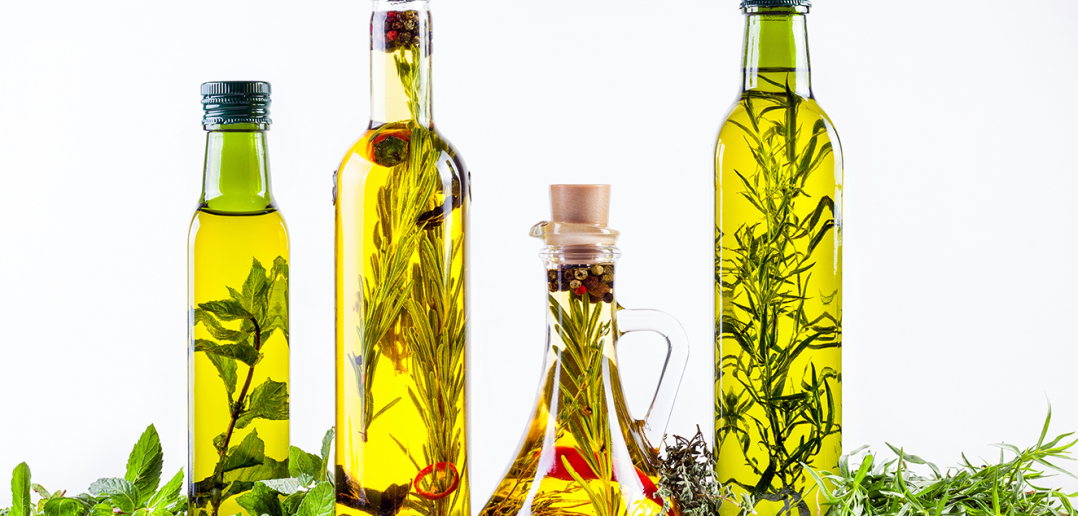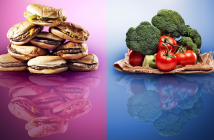First things first, good fats are vitally important to our health – fact! Gone are the days when we need to be scared of consuming fats for fear of piling on the pounds. Eat the right fats every day and you’ll nourish your skin, improve cognitive function, protect your heart, balance hormones, plus you’ll feel fuller for longer.
But not all fats are created equal when it comes to health; read on to find out which to embrace and which are best avoided…
Gone are the days when we need to be scared of consuming fats for fear of piling on the pounds
Cooking with Fats and Oils
Before we go on, it’s important to understand that when it comes to cooking with fats, you want to find one with a naturally high smoke point. This means it won’t burn easily when used for high-heat cooking like stir-fries and oven-baking, which is important because when fatty acids burn, they become damaged and harmful.
| Fats and Oils to Use |
|---|
| Butter – back on the menu, and for good reason – it may lower cholesterol and inflammation, plus help with weight loss, thanks to the conjugated linoleic acid (CLA) it contains. Butter also contains omega 3 fats, vitamins A and K, plus beneficial compounds such as butyrate, phytanic acid and trans palmitoleic acid. Choose grass fed butter where possible. Uses – baking and low heat frying/sautéing – be careful, butter can burn quite easily. |
| Ghee – a delicious traditional healing food that has been used for thousands of years. Easy to make yourself, it contains all the benefits of butter but with a higher smoke point and suitable for those sensitive to dairy. Uses – all-purpose cooking fat |
| Lard and dripping – these completely natural, rendered fats considered traditional and old-fashioned are enjoying a comeback. Cost effective and with a high smoke point so they won’t burn easily. Uses – all purpose cooking fat |
| Coconut oil – medium-chain saturated fats in coconut oil promote a healthy metabolism, help burn fat, support thyroid health, and encourage ketone formation – useful for those following a ketogenic diet. Coconut oil has a high smoke point, and odourless coconut oil is available for foods that require a more neutral taste. Uses – all purpose cooking fat. Also add a tbsp to smoothies to make them extra healthy. Great for topical use too! |
| Extra virgin olive oil – rich in antioxidants, vitamin E and mono-unsaturated fats, this oil is a health hero. You can use it for the lowest heat cooking, but really it’s best drizzled over cooked veggies or leaves, or in a dressing. Uses – drizzling, dressings or very low-heat cooking |
| Avocado oil – rich in mono-unsaturated fats and vitamin E, this oil has similar properties to olive oil but is more suitable to use for cooking food as well as drizzling. Don’t heat it too much though, think light sautéing or low-heat roasting. Uses – drizzling, dressings or low-heat cooking. |
| Unrefined nut and seed oils – such as flax and walnut. These are full of nutrients, plus omega 3 and 6 fats, but don’t be tempted to cook with them as they burn very easily. In fact, they should be kept in the fridge, as they turn rancid readily when exposed to heat or light. Uses – drizzling and dressings. |
| Unrefined rapeseed oil – this scores points for being a locally available product, but only just nudges into the beneficial oils section because most of its health claims are based around it being lower in saturated fat than olive oil. These claims don’t hold weight because we know that saturated fats are not bad for us, and that olive oil is incredibly good for us. It also contains more omega 6 fats than olive oil, which can upset the omega 3/6 balance in our bodies causing inflammation. Rapeseed oil is a better choice for cooking than refined liquid oils, but ideally cook with naturally solid fats like ghee or coconut oil, and use liquid oils higher in monounsaturated or omega 3 fats like olive, avocado or flaxseed oil for pouring. Uses – moderate-heat cooking |
| Fats and Oils to Avoid |
|---|
| Refined liquid oils – such as sunflower, corn, soy, peanut, canola, safflower and mixed vegetable oils in plastic bottles. These not only deliver too much omega 6 fats to the diet which skews the fatty acid balance in the body towards inflammation, but they have also undergone a chemical refinement process to make them suitable for high heat cooking. This process involves use of chemical solvents such as hexane, neutralisers like sodium hydroxide, plus bleaching and deodorizing agents to remove colour, odour or taste in the final product. The resulting oil is damaged and capable of promoting inflammation and free-radical attack in the body. |
| Margarine, shortening and other man-made solid fats – these products are made from refined oils and so for all the reasons listed above, should be avoided! But margarine and other man-made solid fats go through an additional process to turn the liquid oils into solid fats, traditionally via the use of hydrogenated or partially hydrogenated oils, which creates trans fats. Odour is then removed and colours and flavours are added to make the finished product more ‘butter-like’ and appealing. Non-hydrogenated margarine is a better choice, but it is still a very processed product – real butter is always better. |




